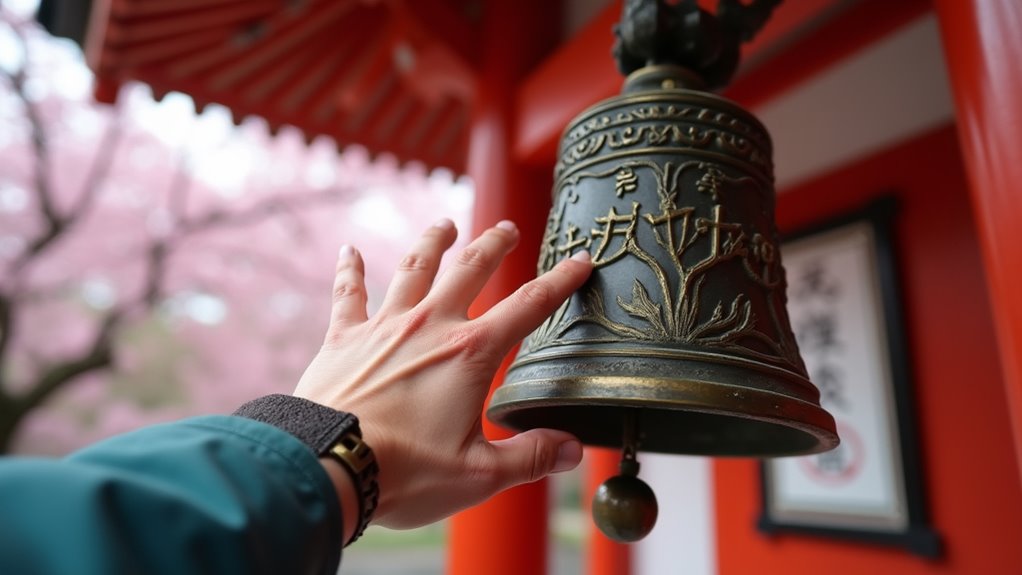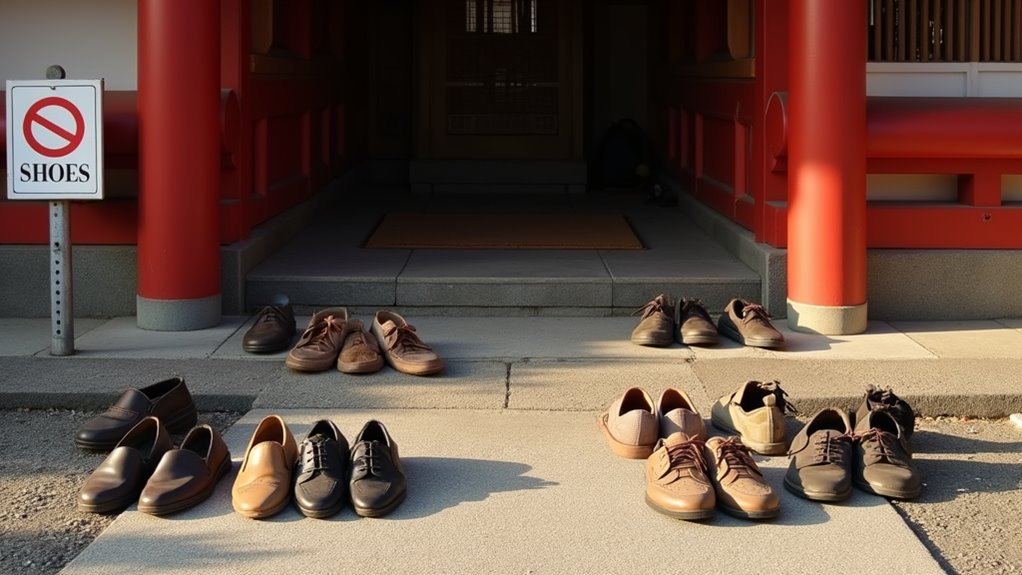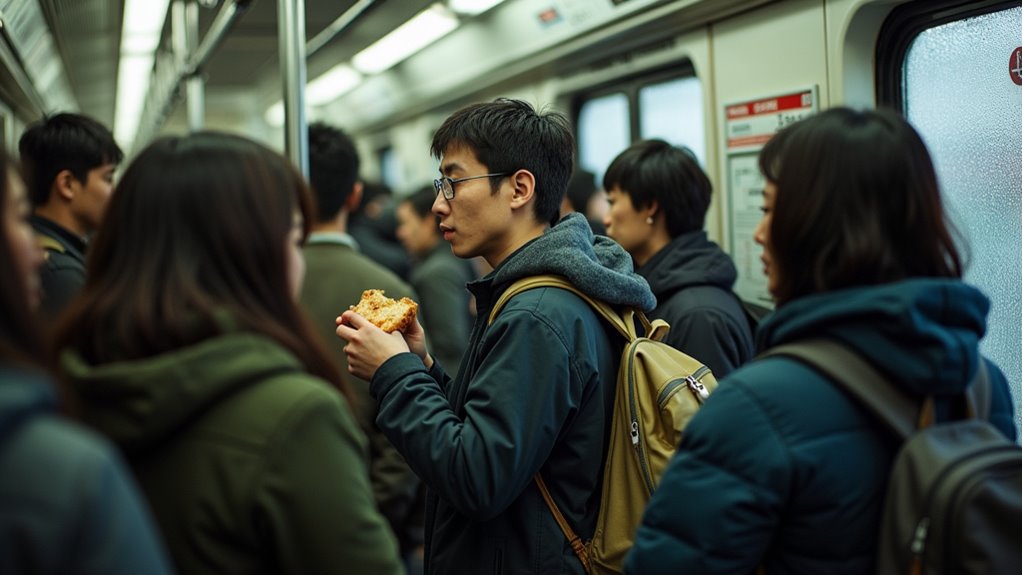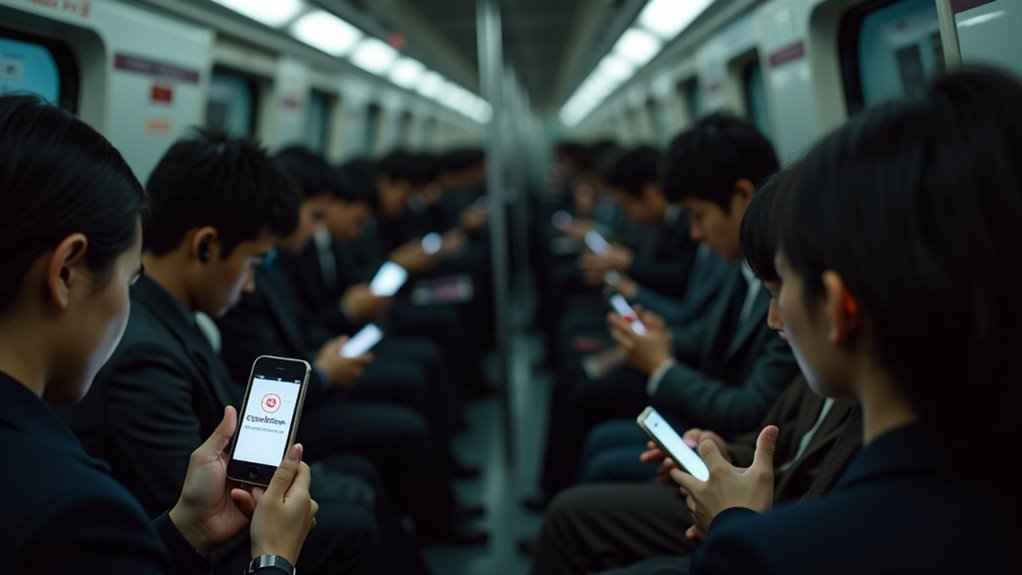Physical Address
304 North Cardinal St.
Dorchester Center, MA 02124
Physical Address
304 North Cardinal St.
Dorchester Center, MA 02124

Foreigners beware: these common Japanese etiquette mistakes could leave you red-faced and locals cringing.
When visiting Japan, avoid tipping, eating while walking, and making loud phone calls in public. Never stick chopsticks upright in rice or pass food directly between chopsticks. Remove your shoes indoors, maintain quiet on public transport, and don’t photograph people without permission. At temples, follow proper rituals and respect sacred spaces. In business settings, present cards with both hands. These cultural nuances will help you blend in and earn local respect during your stay.

When visiting Japan, understanding local customs is essential for respectful interactions. Tipping is considered rude and may cause confusion as service charges are already included in bills. Instead, show appreciation through sincere gratitude.
Always remove your shoes when entering homes, traditional inns, and certain restaurants. Use the provided slippers but never wear them on tatami mats. Remember that toilet slippers are only for bathrooms.
Respect Japanese tradition by removing shoes indoors and using appropriate slippers in designated areas.
In public spaces, avoid eating while walking, speaking loudly on transport, or making noise at night. Don’t photograph people without permission, especially performers or workers in costume. Avoid making thumbs down gestures as they’re considered extremely offensive in Japanese culture.
At sacred sites, don’t walk through the center of torii gates—this path is reserved for deities.
Carry your trash until you find appropriate disposal, as Japan has strict recycling rules.
Proper chopstick etiquette stands as one of the most visible ways to demonstrate your respect for Japanese culture while dining. Avoiding common mistakes will help you make a positive impression on your hosts and fellow diners.
When not using chopsticks, place them on a chopstick rest or parallel across your plate—never crossed. For shared dishes, remember to use the provided serving chopsticks rather than your personal ones to avoid the faux pas of direct transfer from your mouth to communal food.

Japan’s public transportation system ranks among the world’s most efficient, but maneuvering it requires understanding some unwritten rules that locals follow instinctively.
Never make phone calls on trains or buses—switch to silent mode instead. When boarding, queue at marked areas and let passengers exit first before entering. Avoid eating on local trains (though it’s permitted on the Shinkansen).
Phone etiquette is paramount—silence devices, queue properly, and save your snacks for the Shinkansen, not local trains.
Wear backpacks on your front or place them in overhead racks to avoid bumping others.
Priority seats aren’t just suggestions—they’re reserved for elderly, pregnant women, disabled individuals, and parents with small children. Keep conversations quiet, use headphones for media, and be mindful not to take photos of strangers.
Remove large luggage from aisles and stairs to maintain smooth passenger flow. Some urban train lines operate women-only cars during rush hours to provide a more comfortable commuting experience for female passengers.
Dining in Japan involves a complex web of etiquette rules that can easily trip up foreign visitors unfamiliar with local customs. To avoid standing out for the wrong reasons, be mindful of both traditional customs and contemporary expectations.

When visiting Japan’s temples and shrines, you’ll encounter spaces that hold deep spiritual significance for locals. Avoid these common mistakes to show proper respect:
Don’t wear revealing clothes or make excessive noise. Remember to remove your shoes when required and check for photography restrictions before snapping pictures.
At shrines, don’t walk down the center path (reserved for deities), and follow the proper ritual: bow, toss a coin in the offering box, ring the bell, then perform two bows, two claps, and a final bow.
At temples, use the temizuya (purification fountain) correctly by cleansing your hands and mouth. Never walk in front of someone who’s praying, and handle religious artifacts with care. Be mindful that you can recognize temples by their sanmon gates resembling large houses, distinct from the simple torii gates at shrines.
Business meetings in Japan follow a set of unwritten rules that can easily trip up uninformed visitors. The emphasis on respect, formality, and consensus-building creates a business environment quite different from Western practices.

Public hygiene in Japan functions at a level that might surprise many visitors, as practices considered normal to Japanese residents often stand in stark contrast to Western norms.
When in Japan, avoid neglecting regular hand-washing and gargling, as these are daily rituals taught from elementary school. Public facilities often provide wet towels, known as Oshibori, reflecting the cultural importance of cleanliness before eating. Don’t forget to carry hand sanitizer—Japanese people typically clean their hands over 10 times daily.
Refusing to wear a mask when ill will definitely raise eyebrows, as it’s considered inconsiderate toward others. Don’t be careless about your personal appearance, including untrimmed nails, as “Eisei Kensa” (hygiene inspections) are normalized from childhood.
When sick in Japan, wear a mask—it’s common courtesy. Maintain groomed appearance; hygiene inspections are part of the cultural norm.
Finally, don’t assume bathing standards match your home country—Japanese hygiene culture emphasizes cleanliness through regular bathing, especially during summer when many bathe daily.
Despite appearing straightforward on the surface, social interactions in Japan follow complex unwritten rules that can bewilder foreign visitors. Understanding these subtleties will help you avoid unintentionally offensive behavior during your stay.

Japan’s smartphone etiquette follows its own distinct code of conduct that may surprise foreign visitors. When in public spaces, especially on trains and buses, keep your phone on silent mode (“manners mode”) and avoid talking on calls entirely. If you must take a call, step outside or find a private area.
Always use headphones when watching videos or playing games in public. Even typing loudly or displaying personal messages on your screen can be considered impolite. This culture of quiet is also evident in how children are taught to minimize noise in public from a young age.
In business settings, answer calls promptly and introduce yourself properly with your name and organization.
Remember that certain locations like temples, shrines, libraries, and museums require extra discretion with technology. Following these unspoken rules shows respect for Japan’s cultural emphasis on maintaining peaceful public spaces.
Understanding Japanese cultural sensitivities requires awareness of several unspoken rules that govern traditional interactions. When engaging with traditional customs or discussing cultural figures, show appropriate respect to avoid causing offense.
Approaching Japanese traditions with humble respect ensures meaningful cultural exchanges rather than accidental offense.
Remove your shoes when required, follow proper cleansing rituals at water basins, and maintain a reverent tone rather than treating sacred spaces as mere tourist attractions. The Shinto and Buddhist traditions are practiced by 84% of the population, making these sites deeply significant to many Japanese people.
If invited to a tea ceremony or similar event, observe other participants’ actions before proceeding, don’t rush through rituals, and avoid touching ceremonial items without permission.
Never speak dismissively about historical figures like samurai or geisha, respect the depth of traditional art forms like ikebana and bonsai, and refrain from pointing at sacred objects.
By respecting Japanese customs, you’ll have a more rewarding trip and earn genuine appreciation from locals. A friend of mine once bowed deeply to a restaurant owner after a meal, and was rewarded with a small gift of homemade pickles as thanks for his respectful gesture. Remember, it’s not about perfection—it’s about showing sincere effort to honor the culture you’re experiencing.